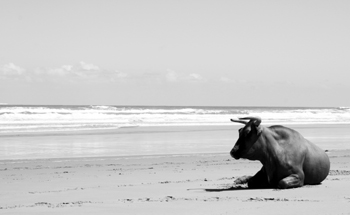![[Metroactive Dining]](/dining/gifs/dining468.gif)
[ Dining Index | Santa Cruz Week | SantaCruz Home | Archives ]
Us vs. Them
Or why baby cows taste better when you call them veal
By Elisa Camahort
After my last column, a reader took me to task, albeit kindly, for saying "animals and the human race," reminding me that humans are, after all, animals themselves. His preferred wording: human and nonhuman animals. While that may seem like splitting hairs, I believe in the power of words. In the political arena it's currently referred to as framing. And it can be powerful. Consider "death tax" vs. "estate tax."
For example, I believe that one of the reasons it's easy for most people to be carnivores is that we've come to call our foods "pork," "beef" and "veal," not "pig," "cow" and "baby cow."
We create lines of division. Us. Them. It's certainly not just between human and nonhuman animals. It seems to be human (perhaps even animal) nature to make those distinctions. But the earliest distinction we draw as humans is between us, the human animals, and them, the nonhuman animals.
It's sort of necessary, right? If you want to feed your kid meat, how else to justify it, other than that animals are different from us? And even more: that some animals are pets and some, food. It's pretty confusing, even illogical, and yet we humans manage to pull it off.
I think it comes at a price, though. A diminishment of what we, the human animals, like to call our humanity. Because basically we are drawing those lines based on superficial traits. I have a line of reasoning I often follow: would you eat, wear or experiment on someone who was brain damaged, or in a paralyzed, vegetative state, or a convicted psychopathic killer? No? Then don't tell me that we eat, wear and experiment on nonhuman animals because they're not as intelligent or as morally upright as we are. We do it because it is convenient, and because we can. But it isn't necessary. And it certainly doesn't elevate us as a society or a species.
So please, whatever you do, don't try to imply that the fact that I draw fewer superficial lines of distinction between myself and other animals is somehow a deficit in my character.
Who would do that, you say? Here's an example.
While I was out to dinner with a large group a couple of weeks ago, the subject somehow came up about the daily in-home treatments I give my cat for her kidney disease. A woman I'd never met before asked me why I gave my cat those treatments.
"Because it's only a couple of minutes per day, doesn't bother her, and it makes her feel better," I reply.
"How old is she?" asks this stranger I had met an hour earlier.
"She'll be 18 in August."
"Don't you want to just put her to sleep?" asks this person.
Um, nope. Did I not make that clear?
This person thought it was perfectly OK to suggest that killing my cat was an acceptable alternative to spending the money and time to treat her. Probably she had some age-line in her head. Younger than that age, and the life was worth maintaining ... older? Why bother?
This person is hardly the only one to feel that way. The very next night, I told a friend the story, and she was equally surprised that I would spend money to treat my cat.
"I draw a pretty distinct line between humans and pets," she said.
And, of course, the kicker that was supposed to seal the moral deal was, "You could always donate that money you spend on her treatments to starving children or homeless people or something."
Sure, I could. She could probably donate the money she spends on lattes to homeless, starving people.
But my view on the morality of pet care is this: I took responsibility for this creature almost 18 years ago. She sleeps on my pillow every night and purrs in my lap while I sit at my computer. I wouldn't throw her away to save a little money, a little time or a little inconvenience any more than you would throw away your aging parents or a small, needy child.
I fully admit: I blur the lines of distinction more than most people do. But imagine the world we would have if human animals were raised to think less of what separates sentient creatures from one another, and more about what we have in common. Imagine.
To quote John Lennon: "You may say I'm a dreamer."
It's good to dream. Change starts with a dream.
Copyright © Metro Publishing Inc. Maintained by Boulevards New Media.
For more information about Santa Cruz, visit santacruz.com.
![]()

Moo-veon-org: Nonhuman animals like sunbathing, too.
From the March 16-23, 2005 issue of Metro Santa Cruz.